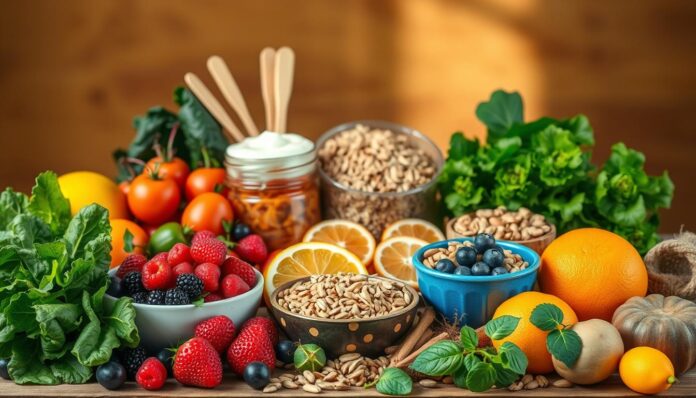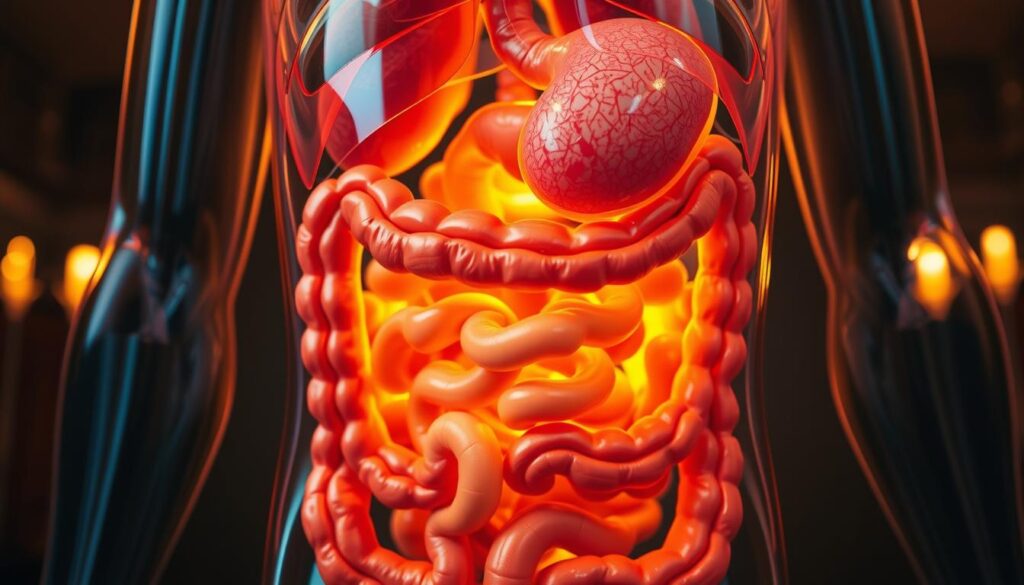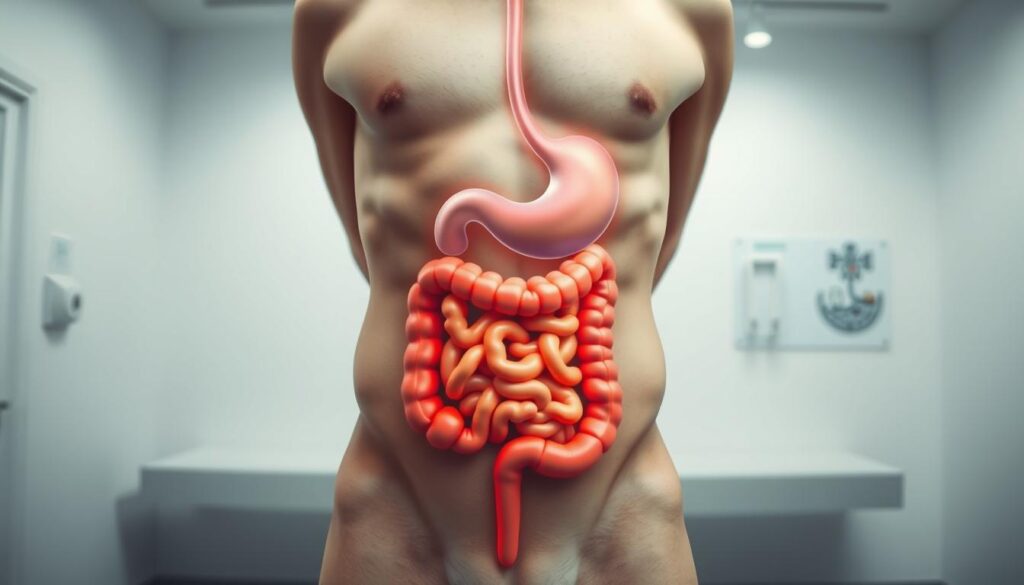Ever thought about how what you eat affects your digestion? The foods you choose can really help your digestive health. This can make your life more comfortable. By picking the right foods, you can support your digestive system and feel better overall.
In this section, we’ll look at how certain foods can help with digestion. This knowledge can help you enjoy life more fully.
Key Takeaways
- Whole grains provide at least 25 grams of fiber daily, which is key for a healthy colon.
- Leafy greens, like spinach and kale, are full of nutrients and help your gut bacteria grow.
- Lean proteins, such as chicken and fish, are better for your digestion than fatty foods.
- Low-fructose fruits, like berries and bananas, are gentler on your stomach.
- Drinking enough water is important; it helps fiber do its job.
- Yogurt with probiotics can help with irritable bowel syndrome (IBS) symptoms.
Understanding Digestion and Its Importance
The digestive process is a complex journey. It turns food into essential nutrients for your body. This system breaks down proteins, fats, and carbohydrates into simple forms.
Your small intestine absorbs water and vital nutrients. The large intestine extracts more water and turns waste into stool. A diet rich in fiber helps move stool through your system.
Digestive enzymes and juices break down food into nutrients. Beneficial bacteria in the large intestine break down remaining nutrients and make vitamin K. Whole foods are rich in nutrients and support gut health.
Processed foods, on the other hand, can cause gut inflammation. Artificial sweeteners in processed items can upset the balance of gut bacteria. This can lead to digestive problems.
Adding prebiotics from wholesome foods helps healthy gut bacteria grow. This improves digestion. Understanding digestion shows why healthy eating is key for good gut health.
Common Digestive Problems
Digestive issues affect many people, with over 15% in Western countries having severe gut sensitivity. Conditions like irritable bowel syndrome (IBS), bloating, constipation, and diarrhea are common. Changing your diet can help ease these symptoms.
IBS is very common, causing stomach pain, bloating, and changes in bowel habits. Eating the right foods can help manage these symptoms. Foods high in fiber help with regular bowel movements and reduce inflammation.
Some foods can make gas and bloating worse. Foods like beans, broccoli, and dairy can cause discomfort. It’s important to eat high-fiber foods slowly and drink plenty of water. Also, avoid fizzy drinks and exercise regularly to reduce bloating.
For diarrhea, it’s key to drink enough water to avoid dehydration. Making simple diet changes can greatly help with digestive problems. Look into healthy eating practices to lessen IBS and other digestive issues. These changes can improve your digestive health.
Foods to Improve Digestion
Adding the right foods to your diet can boost your digestive health. Foods like fiber-rich and gut-friendly options help your gut thrive and ease digestive problems. Let’s look at some foods that help with digestion.
Whole Grains: The Fiber Powerhouse
Whole grains like brown rice, quinoa, and whole wheat bread are full of fiber. They help keep your bowels regular and control blood sugar. Try to eat at least 25 grams of fiber from whole grains each day.
These grains digest slowly, giving you energy and keeping your digestive system healthy. They’re key to a balanced diet.
Leafy Greens: Fuel for Healthy Gut Bacteria
Leafy greens like kale, spinach, and Swiss chard are rich in nutrients and fiber. They feed good gut bacteria with a sugar called sulfoquinovose. This helps with digestion and keeps your bowels regular.
Eating a variety of leafy greens boosts your nutrient intake and digestive health.
Lean Proteins: Making Better Choices
Choosing lean proteins like salmon, chicken, and legumes is good for your digestion. They’re low in fat, which can upset your stomach. Adding unsaturated fats, like olive oil, helps with nutrient absorption and bowel health.
These choices lead to a healthier diet that supports digestion and overall health.
Gut-Friendly Foods That Promote Digestion
To keep your digestive system healthy, eating gut-friendly foods is key. These foods help digest food better and keep good bacteria in balance. By picking the right foods, you can feel better and keep your gut healthy.
Low-Fructose Fruits: Tummy-Friendly Options
Low-fructose fruits are great for better digestion. Berries like cherries, blackberries, raspberries, and blueberries are tasty and full of fiber and nutrients. They fight inflammation.
Bananas and pears have resistant starch and pectin. These feed good bacteria and help your digestion. Watermelon is also good, with its prebiotic fibers helping your gut.
Fermented Foods: The Role of Probiotics
Fermented foods are important for a healthy gut. Yogurt, kefir, sauerkraut, and kimchi are full of probiotics. They help good bacteria grow in your gut.
These foods make digestion better and boost your immune system. Adding them to your meals is a tasty way to support your gut health.
Benefits of Drinking Fluids for Digestive Health
Drinking enough water is key for good digestion and gut health. Water helps break down food and makes nutrients easier to absorb. It also helps make saliva, which is important for starting digestion.
Water in the stomach acid helps break down food better. This makes digestion work better.
Drinking fluids can stop constipation by making stools softer. Drinking water with meals helps you feel full. This can help with weight control. Water also helps food move smoothly through your digestive system.
Dehydration can cause dry stools and constipation. This can hurt your digestion. To stay hydrated, eat foods like watermelon, cucumbers, and oranges. Avoid drinks like caffeine and alcohol that can dry you out.
Check your hydration by looking at your urine color. If it’s pale yellow, you’re good. Drinking water helps break down food and absorb nutrients better. Drinking water before meals can also help with digestion.
Hydration is key to avoiding constipation and keeping bowel movements regular. It also helps keep your gut microbiome balanced. This is important for your overall health and digestion. Make sure to drink enough water for good digestive health.
| Benefits of Hydration for Digestion | Description |
|---|---|
| Aids in Food Breakdown | Water helps to break down food, making nutrients easier to absorb. |
| Promotes Saliva Production | Saliva is key for digesting food properly. |
| Supports Stomach Acid | Water is part of stomach acid, helping with digestion. |
| Prevents Constipation | It makes stools softer, making it easier to pass them. |
| Enhances Gut Health | It helps keep your gut microbiome balanced for better digestion. |
Easy-to-Digest Foods for a Happier Gut
Eating foods that are easy to digest can really help your gut health. Adding natural digestion aids to your meals makes your diet better. Many foods help digestion, easing discomfort and bloating.
Digestive Enzymes: Natural Aids in Food
Yogurt and fermented foods are full of probiotics, which are good for your gut. Yogurt helps grow healthy bacteria for digestion. Apples are also great because they have lots of fiber, like pectin, which helps your gut move and feeds good bacteria.
Whole grains add bulk to your stool, helping prevent constipation. Bananas are easy to digest and full of potassium. Ginger helps food move through your digestive system faster.
Leafy greens have magnesium and fiber, important for your gut’s muscle contractions. Include steamed and cooked veggies like peeled potatoes, spinach, and carrots. Also, eat lean proteins like chicken and fish.
Canned or cooked fruits, like applesauce and ripe bananas, are gentle on sensitive stomachs. Refined grains and low-fat dairy products are also easier to digest.
Adding these foods to your meals can greatly improve your digestive health. Choosing natural digestion aids leads to a healthier gut, boosting your overall well-being.
Foods to Avoid for Better Digestion
Knowing which foods to avoid is key to better digestion and comfort. Some foods can cause bloating, gas, and cramps. Cutting down on these can greatly help your digestive health.
Spicy foods can make your belly hurt and cause diarrhea. For people with IBS, fruits like dried fruits, apples, and pears can make digestion worse. Grains with gluten, like wheat, rye, and barley, can also cause problems for those with celiac disease.
Soda, with its high-fructose corn syrup, can make IBS symptoms worse. Artificial sweeteners in diet products can also cause gas and bloating. Drinking too much alcohol can upset the balance of gut bacteria and lead to diarrhea.
High-fat foods, like fried items, can harm your gut microbiome and cause inflammation. Processed foods with additives and preservatives can also upset your gut’s balance. Dairy products can make some people feel bloated and gassy. Too much caffeine can lead to acid reflux and heartburn.
Be mindful of how common foods like tough meats and high-fat dairy affect your digestion. Whole grains with additives and sweeteners can also cause discomfort. Avoiding these foods can improve your digestive health and make life more comfortable.
The Role of Dietary Fiber in Healthy Digestion
Dietary fiber is key for healthy digestion. It comes in two types: soluble and insoluble. Each type has its own benefits for your digestive system. Eating enough fiber helps prevent constipation and keeps your gut healthy by supporting good bacteria.
Sources of Dietary Fiber: What You Should Know
It’s important to eat a variety of fiber-rich foods. The daily fiber intake varies by gender. Women aged 19-50 need 25 grams, while men need 38 grams. Yet, most people only get about 15 grams a day.
Insoluble fiber helps make stool bulkier. You can find it in whole grains, veggies like carrots and celery, and fruits with skins. It’s great for regular bowel movements.
Soluble fiber dissolves in water and helps lower cholesterol and blood sugar. You can get it from oats, beans, apples, and citrus fruits. Eating both types of fiber can lower the risk of heart disease and diabetes.
To meet your fiber needs, try eating foods high in fiber. A handy guide is this dietary guide. For example, a medium apple has about 3 grams of fiber. Artichokes have up to 5 grams, and beans offer 6 to 20 grams per serving. A diet rich in fiber supports gut health and may lower the risk of colorectal cancer.
Cooking Methods That Enhance Digestive Health
Choosing the right cooking methods can make a big difference in how well your body digests food. Using techniques that reduce harmful compounds and keep nutrients intact helps your body absorb what it needs. This can also reduce discomfort.
Soaking whole grains, beans, and lentils in baking soda or kombu for 8-24 hours can help. This process cuts down on lectins and phytic acid, leading to less gas and better digestion. Sprouting these foods for 1-2 days further breaks down harmful compounds, increases nutrient value, and makes enzymes more available.
Pressure cooking is also a great method. It reduces fermentable sugars in beans, legumes, and grains, making them easier to digest. Marinating meat in lemon juice or vinegar can also help, as it breaks down proteins and aids digestion, even for those with low stomach acid.
It’s better to cook plant foods instead of eating them raw for easier digestion. Slow cooking keeps moisture in, making meat tender and easier to digest. Stews, braises, and low-heat roasting (below 350°F) are great for tender dishes.
Simmering beans gently breaks down tough fibers and connective tissues, making them more digestible. Braising, which involves cooking food slowly in a small amount of liquid, helps preserve nutrients and enhances flavors.
Steaming vegetables is a top choice because it keeps vitamins and minerals intact. The moisture from steaming helps break down fiber, making these foods easier for your digestive system. Adding carminative spices like fennel, ginger, cumin, and coriander to your meals can also help reduce bloating and improve digestion.
Using warming spices like cinnamon and cloves can aid digestion, while cooling spices like mint and cardamom can help with indigestion and bloating. Adopting these cooking methods and using recipes that are friendly to digestion can greatly improve your digestive health.
Building a Balanced Diet for Digestive Health
A balanced diet is key for good digestive health. Eating a variety of nutrient-rich foods is important. Include high-fiber fruits, veggies, and whole grains in your meals. These foods help you feel full and support a healthy gut by feeding good bacteria.
Meal planning is essential. Add probiotic foods like yogurt, kimchi, and kefir to your diet. These foods boost gut bacteria and improve digestion. Also, cooking meals in advance helps you stay on track with a balanced diet.
Choose wholegrain options when planning meals. Go for wholegrain cereals or porridge. Add nuts, seeds, and fruits for a nutritious start. Eating regularly helps keep digestion smooth and prevents discomfort.
Keep your pantry stocked with fresh, organic foods and whole grains. Avoid processed foods, additives, and artificial sweeteners. They can harm your gut health. Drink 1.5 to 2 liters of water daily to keep your bowels healthy and prevent constipation.
Your diet greatly affects your gut health. Improve your meal planning to include lighter evening meals. This can ease discomfort and improve digestion. Eating more plant-based foods boosts fiber intake, which is great for digestion.
By following these tips, you can make a diet that supports digestive health. For more ideas, check out meal planning strategies focused on digestive health.
Conclusion
The path to better digestive health starts with the foods you eat. Choosing high-fiber foods like whole grains, fruits, and veggies is key. These foods help with regular bowel movements and gut health.
Foods with probiotics, like low-fat yogurt and sauerkraut, add good bacteria. This improves how your body absorbs nutrients and balances your gut flora.
Also, avoiding processed foods can reduce inflammation. This makes digestion easier. Drinking enough water helps soften stools and aids digestion. These habits can prevent digestive problems and help you stay healthy.
Being mindful of what you eat is more than just managing digestion. It’s about living a healthier lifestyle. By focusing on healthy eating, you set yourself up for long-term wellness and comfort in your gut. Start eating healthy today and feel the difference in your digestive health and overall energy.
FAQ
What are some foods that can improve digestion?
Foods like oatmeal and quinoa can help your digestion. Leafy greens like kale and spinach are also good. Lean proteins and low-fructose fruits like berries and citrus are beneficial too. Don’t forget fermented foods like yogurt and kimchi for their probiotics.
How can I enhance my gut health?
To boost your gut health, eat a variety of gut-friendly foods. Drink enough water and eat enough fiber. Choose easy-to-digest foods and add probiotics to support a healthy gut.
What are easy-to-digest foods for better digestive health?
Foods like kefir, papaya, and bananas are easy on your stomach. They have natural digestive enzymes that help with digestion and reduce discomfort.
How does hydration affect digestion?
Drinking enough water is key for digestion. It softens stools and helps food move through your system. Water with meals can also prevent constipation.
Which foods should I avoid to maintain better digestion?
Avoid high-fat foods like fried items and spicy dishes. Some fruits can also upset your stomach, like those that trigger IBS or heartburn.
What role does dietary fiber play in digestion?
Fiber is vital for digestion. It helps with bowel movements, keeps blood sugar stable, and supports gut health. Aim for 30 grams of fiber daily from fruits, veggies, whole grains, and legumes.
Are there specific cooking methods that can support digestive health?
Yes, grilling, steaming, and boiling are better for digestion. They add less fat and help keep nutrients in your food.
How can I build a balanced diet for better digestive health?
For a balanced diet, include foods that aid digestion. This means fiber-rich fruits and veggies, probiotics, and plenty of water. Meal planning helps ensure you eat these foods regularly.






